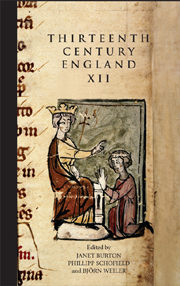Book contents
- Frontmatter
- Contents
- PREFACE
- LIST OF CONTRIBUTORS
- LIST OF ABBREVIATIONS
- The English and the Welsh in Fouke le Fitz Waryn
- Royal Piety in Thirteenth-century Scotland: The Religion and Religiosity of Alexander II (1214–49) and Alexander III (1249–86)
- The 1213 Pipe Roll and Exchequer Authority at the End of John's Reign
- The Public Debate during the Baronial Rebellion
- Richard of Cornwall and the Baronial Opposition in 1263
- Les liens personnels entre les cours de France et d'Angleterre sous le règne de Philippe III, 1270–85
- The Lay Opposition to Edward I in 1297: Its Composition and Character
- Peacekeepers and Lawbreakers in London, 1276–1321
- ‘The peace less kept’? The Origins, Revelations and Impact of Edward I's ‘Trailbaston’ Commissions of 1305–7
- Notes and Documents
‘The peace less kept’? The Origins, Revelations and Impact of Edward I's ‘Trailbaston’ Commissions of 1305–7
Published online by Cambridge University Press: 12 September 2012
- Frontmatter
- Contents
- PREFACE
- LIST OF CONTRIBUTORS
- LIST OF ABBREVIATIONS
- The English and the Welsh in Fouke le Fitz Waryn
- Royal Piety in Thirteenth-century Scotland: The Religion and Religiosity of Alexander II (1214–49) and Alexander III (1249–86)
- The 1213 Pipe Roll and Exchequer Authority at the End of John's Reign
- The Public Debate during the Baronial Rebellion
- Richard of Cornwall and the Baronial Opposition in 1263
- Les liens personnels entre les cours de France et d'Angleterre sous le règne de Philippe III, 1270–85
- The Lay Opposition to Edward I in 1297: Its Composition and Character
- Peacekeepers and Lawbreakers in London, 1276–1321
- ‘The peace less kept’? The Origins, Revelations and Impact of Edward I's ‘Trailbaston’ Commissions of 1305–7
- Notes and Documents
Summary
Named after those highwaymen who brandished ‘trailbastons’, or clubs, with which to beat their victims, Edward I's great commissions into crime, issued in 1305, achieved notoriety almost immediately, meriting a mention in a number of the chronicles of the period. Historians, too, have frequently commented on them, though there has been little research on disorder in this period or on the ‘trailbaston’ commissions directly, which is surprising given their fame. My aim here is to evaluate the historiography of ‘trailbaston’, and to offer some new thoughts on the origins, revelations and impact of what were, at the time of their genesis, the most wide-ranging enquiries into disorder ever yet attempted in medieval England.
The ‘trailbaston’ commissions did not emerge suddenly and fully formed in 1305, though how exactly they came about is a matter of debate. Certainly there were standard vagabond commissions in a number of counties in 1304 – suggesting governmental concern with crime – before a more wide-ranging commission to make inquiry under a set of articles was issued in November. (This may or may not have been linked to the findings of the earlier, more standard vagabond commissions, but there is no evidence to deduce that for certain.) Under the terms of this new commission, the justices were not only to inquire into malefactors, but also those who ‘hired’ them. By March 1305 further commissions had been sent out to several other counties.
- Type
- Chapter
- Information
- Thirteenth Century England XIIProceedings of the Gregynog Conference, 2007, pp. 123 - 138Publisher: Boydell & BrewerPrint publication year: 2009



